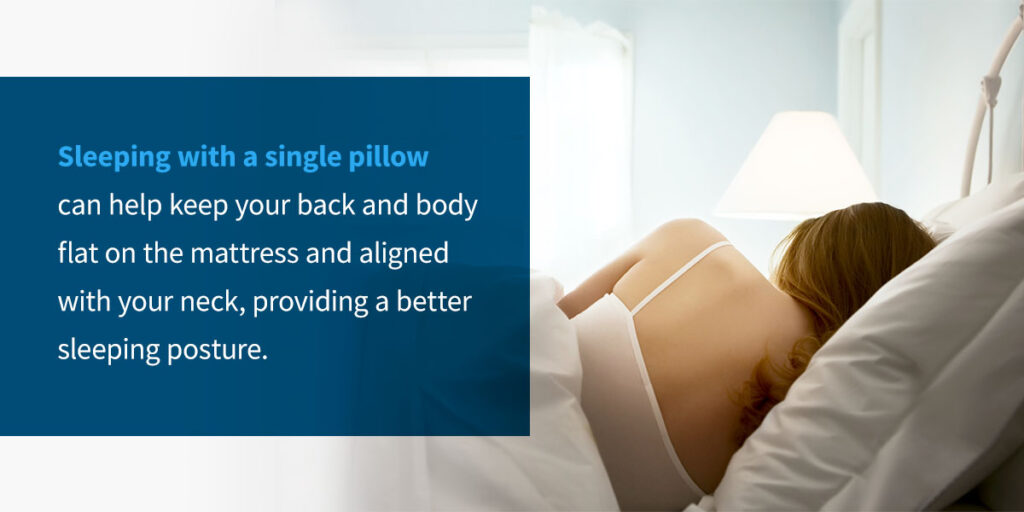Our daily responsibilities sometimes mean that our physical health and sleep habits take a back seat. We may experience back or neck pain, but choose to push through the discomfort or try a variety of at-home remedies in an attempt to alleviate the ache. In our fast-paced world, this is normal! The reality is that the cause of daily aches and pains may be poor sleep posture.
A poor sleep position or posture can impact daily life as well as the quality of your sleep — creating a cycle of decreased sleep quality and ongoing discomfort. By taking steps to correct your sleeping posture, you can work toward alleviating discomfort and improving your sleep in the long term.
How to Correct Your Sleep Posture in 6 Steps
Prioritizing good sleep positions can help you correct and improve your overall sleep posture. With a healthier posture while you sleep, you can alleviate pain and discomfort and enhance your well-being. Here are the top six chiropractor tips for better sleep posture.
1. Try Sleeping in Different Positions
Changing or finding suitable sleep positions is one of the best ways to fix your sleep posture.
Maybe you experience discomfort like neck and back pain and poor sleep but don’t know why. By trying different sleep positions, you can identify if a particular way of sleeping is causing discomfort. The right sleep position can improve your posture and ultimately your sleep quality and physical health.
There are a few simple methods you can use to adopt a new sleep posture. For example, use pillows between your knees when sleeping on your side, and a pillow beneath your lower back when sleeping on your back. If you want to avoid sleeping on your back, tie an object to the back of your shirt, which helps encourage you to sleep in a different position. Then, see if these small changes make an impact on your sleep quality and level of discomfort you experience during the day.
2. Avoid Sleeping on Your Stomach
Sleeping on your stomach offers very little spine support. Stomach sleeping, also called prone position, may also cause more discomfort in people with back pain and spinal injuries.
When you sleep on your stomach, your neck and head are often awkward. Your torso sinks deep into the bed, forcing you to twist your hips and putting tension on your spine. Sleeping on your stomach means your spine is in an unnatural position for a long time, and this can cause upper back and neck pain.
3. Buy a Suitable Pillow and Mattress
Your pillow and mattress play a vital role in your sleep quality and posture. Sometimes, your pillow might be too soft or too hard compared to your bed’s firmness. This difference can strain your neck and head, causing poor sleeping posture and spinal misalignment.
It’s important that your pillow has roughly the same firmness as your mattress. Proper pillow support can provide better head and neck alignment and help fix your sleep posture. If you have a medium-firm mattress, consider using a medium-firm pillow.
4. Limit the Number of Head Pillows
Resting your head on too many pillows can cause an imbalance between your neck, head and body. It can also cause discomfort since your neck stretches while you sleep. Sleeping with a single pillow can help keep your back and body flat on the mattress and aligned with your neck, providing a better sleeping posture.
5. Use Additional Pillows for Support
Extra pillows can come in handy by providing additional support to other areas of your body. You can use pillows to support your back, knees and hips to encourage a better sleep posture. For example, if you sleep on your back, place a pillow behind your lower back to maintain your position and keep your spine in alignment.
6. Get Professional Treatment
If you have chronic pain, discomfort and inadequate sleep due to poor sleep posture, consider reaching out to a chiropractor. They can provide an appropriate diagnosis and prescribe suitable treatments, exercise programs and other guidance for correcting your sleep posture.
How to Support Your Neck While Sleeping
Aligning your neck and spine at the same level is one of the best ways to support your neck while asleep. Here are some methods to keep your neck supported when sleeping:
- Sleep on your side to keep your head stable and spine neutral.
- Match your pillow firmness with your mattress.
- Use a thicker pillow under your neck than your head to keep your neck and spine aligned.
- Sleep with a pillow under your knees to support your lower back and keep it curved when resting on your back.
How to Choose the Best Sleeping Position
Choosing a suitable sleeping position depends on your needs and preferences, including whether you prefer to sleep on your back or side.
Back
Sleeping on your back is one of the best ways to support your neck and spine. This sleep position can alleviate lower back pain and stiffness by keeping your body aligned. Back sleeping may also help with snoring when you sleep with your back and head on an inclined or elevated pillow.
At the same time, this position may not be suitable for people who are pregnant and people with sleep apnea. Back sleeping can also put weight on your spine and constrict your airways, affecting those with sleep apnea. It can also promote and worsen acid reflux.
Your mattress is a vital consideration when sleeping on your back. A mattress that is too soft can cause misalignment between your body, neck and head. A medium-firm mattress can be the best option to keep your back curved and your body aligned.
Side
Finding a suitable side-sleeping position can help you rectify your sleep posture. You can experiment with varying positions of side-sleeping, like the fetal variation. The fetal position can benefit those with lower back pain and people who are pregnant. It may not be the best option for shoulder and arm pain as it can add pressure to these areas.
In the provocative side-sleeping position, your hips might twist, causing a spinal misalignment. While this position can be comfortable, it might be less favorable for your spine than the fetal variation.
Improve Your Sleep Posture With Upper Cervical Chiropractic of New York, PC
While changing your sleep position can improve your sleep and well-being, the benefits may be only temporary without an accurate diagnosis. Ongoing back pain and discomfort can require specialized treatments in addition to correcting your sleep posture.
At Upper Cervical Chiropractic of New York, PC, we offer highly specialized treatment solutions for correcting spinal misalignment and relieving pain. We focus on each client’s individual needs to provide accurate and effective chiropractic care.
For more information or to schedule a consultation, contact our office today.





